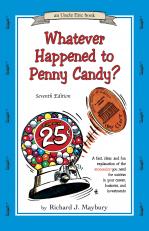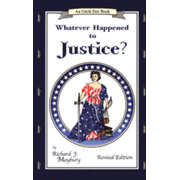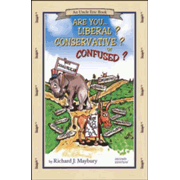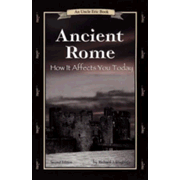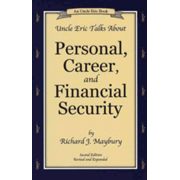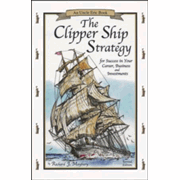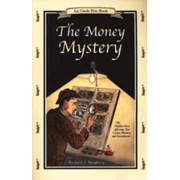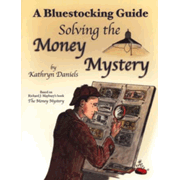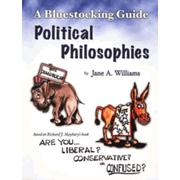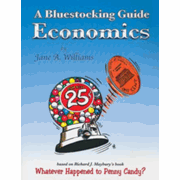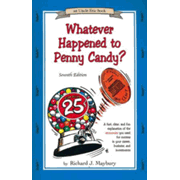Richard Maybury, under the guise of "Uncle Eric," teaches basic concepts in both economics and government in language that children and teens can understand.
Each book is written as a series of letters from Uncle Eric to Chris, who could be either his niece or nephew. Maybury has a gift for translating what sounds like tedious information into very personalized examples. Each letter is reasonably brief, so students will not be overwhelmed with too much information at once. You should begin with Whatever Happened to Penny Candy? with children anywhere from about sixth grade level through high school. The other books should wait till at least junior high or high school level.
Whatever Happened to Penny Candy?, 7th edition
For the economically illiterate—children or adults—begin with the book Whatever Happened to Penny Candy?, a simple, entertaining introduction to economics. Penny Candy begins by talking about economics where it touches us most—continuing increases in the cost of things. Uncle Eric explains the economic facts of life simply, adding interesting historical tidbits along the way. Doses of economic theory in each letter are just enough to prod thinking without overload.
He covers topics such as the nature of money, inflation, government manipulation of the money supply, velocity, the federal debt, and the causes of the 2008 recession. In the latest (seventh) edition, he adds a brief explanation of the Federal Reserve. The concluding chapter, "Natural Law and Economic Prosperity" explains how many of our present day problems stem the from shift away from Natural Law principles in favor of Civil (or Roman) Law—Natural Law presumes a higher authority than governments (a creator) while Civil Law can shift according to current attitudes and the popular "will." Maybury makes clear the connection between forms of government and economic policies that follow from them.
Maybury has also included an excellent annotated bibliography with suggestions for where to go next to learn more about economics.
While Whatever Happened to Penny Candy? can be read on its own, I highly recommend that you also use the companion study guide (written specifically for Whatever Happened to Penny Candy?), A Bluestocking Guide: Economics by Jane Williams.
It begins with an introductory lesson on the "Author's Disclosure and Point of View," something both students and teachers might be tempted to skip over. The study guide begins with this to establish the fact that Penny Candy is presenting a definite point of view with no apologies, and it teaches students to be more aware of an author's point of view. Next are nine short articles, some of which you should read to or with students before delving into Penny Candy. A Bluestocking Guide shows which articles are appropriate for different age levels, so you can select only those most suitable. The study guide then includes lesson plans, activities, and quizzes for each chapter plus a final exam, answer keys, suggestions for further study (films, books, and documentaries), and an economic timeline that incorporates further study recommendations by time periods and events. Quizzes and tests include short answer, multiple choice, true/false, and essay questions. Essay questions might also be used for discussion. Some lessons include research assignments.
A Bluestocking Guide: Economics, like other guides from Bluestocking Press, is not reproducible. You need to purchase one for each student plus one for the teacher. You might want to remove the pages that serve as answer keys from student books although the final page of answers backs onto the first page of the economic timeline. You will have to figure out how to solve that problem. Note that the guide for the seventh edition of Penny Candy is compatible only with the latest edition of the guide—both have a 2015 copyright.
Cathy's note: With older students, consider following this book with Maybury's The Money Mystery: The Hidden Force Affecting Your Career, Business and Investments and, possibly, The Clipper Ship Strategy.
Whatever Happened to Justice?
In my opinion, Richard Maybury's Whatever Happened to Justice? is as good or better than Whatever Happened to Penny Candy? Written for a slightly older audience (ages fourteen and up), it discusses how our justice system has changed from reliance upon common law to a reliance on political law. He shows how the abandonment of common law has left us with a fickle system that reacts to pressure as much as to any more important factor of law.
Some "chapter" titles are "Two Kinds of Law," "The Lawless West," "Instability, Nuremberg, and Abortion," "Competing for Privilege," "The Constitution: Highest Law of the Land?," and "Are Lawyers and Judges Corrupt?" Final letters address "unsolved problems" such as risk, capital punishment, the environment, and poverty. Whatever Happened to Justice? covers issues of government and law that are not addressed in any other textbooks.
Use this book as an introduction and/or supplement to American history or government studies. It will not take much time to read through, although it might generate lengthy discussions. (Note: Maybury writes from the political, legal, and economic viewpoints of the Founding Fathers, but not from a Biblical Christian perspective. This should raise the issue for students to consider: how do we call anything right or wrong, good or evil, without a clear source for deriving our definitions of good and evil?) No matter what else you use, this book is a must read!
A Bluestocking Guide: Justice by Kathryn Daniels can be used as a study guide along with Whatever Happened to Justice?
Are You Liberal? Conservative? or Confused?
Follow Whatever Happened to Justice? with this book. Those who haven't read the previous Uncle Eric books can still understand Maybury's message here, but they will benefit far more if they have first read the others. Using the same letter-format of earlier books, Maybury tackles political labels and what they represent. From conservatives and liberals to Nazis and Communists, he shows how they all believe in state control to varying degrees. (He does a great job describing the difference between socialism and communism, two "isms" people generally lump together as one.)
He proposes a new label, juris naturalis (essentially natural law), to describe those who prefer as little government control as possible and proceeds to argue the case for this position. (Most will recognize this as fairly similar to libertarian philosophy.)
As always, Maybury translates concepts that confuse many adults into language clear enough for teens to understand. Since Maybury does not write from a biblical perspective, his idea of juris naturalis extends only as far as "freedom" issues and does not address Christian viewpoints of how individuals should function under our government.
A Bluestocking Guide: Political Philosophies by Jane A. Williams serves to “reinforce and enhance a student’s understanding” of the material presented in Are You Liberal? Conservative? or Confused? Similar in format to the Bluestocking Guide: Economics, it has both comprehension and application questions for each chapter, suggestions for further reading or viewing, and an answer key. Designed to be used across a wide span of grade levels, parents/teachers will need to select the appropriate questions and activities for each student. Comprehension questions include definition, true/false, fill-in-the-blank, and short answer questions. Definition questions include columns of terms to be matched, but they also frequently instruct students to write out definitions. (Students might refer to the glossary in Are You Liberal? Conservative? or Confused? ) Some of the activities require extensive reading and/or research and should be assigned only to older students. This Guide adds substantially to the learning process, since the assignments really require students to read, think, and write as they develop their own political philosophy.
Ancient Rome: How It Affects You Today
This "Uncle Eric" book follows Maybury's Are You Liberal? Conservative? or Confused? While it is not necessary to read the other Uncle Eric books first, it is helpful to read the entire series since the ideas presented in each book are interconnected.
Government is the main topic in Ancient Rome even though economics gets considerable attention. The focus is upon the ancient Roman Empire model of a strong central government since that model has been adopted by so many societies since Rome.
Maybury takes us on a brief tour through historical events, highlighting "Roman" governmental systems in action. Ultimately, the subject is the government of the U.S., our gradual shift to the Roman model, and the economic consequences we should expect from what Maybury calls the "Roman disease."
He repeats the limited government theme that is foundational to all of the Uncle Eric books. As with the other books in this series, Maybury uses a series of letters from Uncle Eric to convey heavy concepts in easily-digestible chunks, appropriate for all teens. As noted previously, Maybury writes from a philosophical basis that is consistent in many ways with the principles of America's founders: limited government, free markets, and higher law principles. Since he does not write from a Biblical perspective, we need to add that dimension ourselves.
You might use this book in conjunction with your studies of U.S. government.
A Bluestocking Guide: Ancient Rome by Jane Williams can be used with Ancient Rome: How It Affects You Today.
The Money Mystery: The Hidden Force Affecting Your Career, Business and Investments
As in Whatever Happened to Penny Candy?, Richard Maybury uses the same format to explain how money supply and control works. While Penny Candy introduces economic basics, this book focuses on narrower aspects of economics that few people recognize yet under which everyone suffers. Maybury addresses inflation, paper money, the gold supply, interest rates, and "velocity" with real-life examples such as the Carter Administration's runaway inflation and the run on the dollar that resulted from the U.S. freeze of Iranian assets in retaliation for the Ayatollah Khomeini's seizure of the American embassy and 52 hostages. While the concept level is a large step beyond Penny Candy, the presentation is still at a level most older teens can understand. While I might use Penny Candy in junior high, I would probably save this book until the last few years of high school. The book is actually directed at older students and adults as one might guess from Maybury's inclusion of recommendations of where to keep your economic assets at the end of the book. (Note: My recommendation of this book does not include an endorsement of Maybury's investment strategies.)
A Bluestocking Guide: Solving the Money Mystery by Kathryn Daniels can be used with this book.
The Clipper Ship Strategy
The Clipper Ship Strategy should follow Whatever Happened to Penny Candy? and The Money Mystery for those who want to go further in the study of economics and government. This book covers practical business economics: how to determine what type of businesses to pursue, how to structure those businesses, where to keep your assets, what type of assets to keep, how to develop a dependable customer base, how to keep your business afloat and even prosper when others are going bankrupt, how to identify the best locations for businesses and customers, and much more.
Recognizing that our government daily increases its intrusion into the economic functioning of our country, Maybury suggests ways to protect ourselves from the dangers of that intrusion. As Maybury says, just as we might try to protect ourselves from Godzilla on the loose in downtown Tokyo, we must develop a plan to protect ourselves from a Godzilla-like government that might at any moment do something to wreak havoc in our lives and businesses.
Written in Maybury's easy-to-understand style, mature teens should be able to handle the reading level. They will need some life experience and motivation to handle the content—possibly their own experience in some sort of business.
While Maybury's "lessons" are valuable for everyone, I especially recommend this book to potential entrepreneurs and businessmen. I would make it required reading for them if I could. (Those who might be employees can also find out how to select a career and/or company to work for that is likely to remain economically healthy!)
Maybury also includes numerous references to articles that will enhance our understanding of economics and business. You might not agree with all of Maybury's suggestions, but after reading it, I expect you will know more about the way business really works than many business college graduates.
A Bluestocking Guide: Applying the Clipper Ship Strategy by Kathryn Daniels can be used with this book.
Evaluating Books: What Would Thomas Jefferson Think About This?
The typical public school education in government, history, economics, and law that most of us have endured was usually an indoctrination into a quasi-socialist point of view. Rarely were we taught about natural law, free market economics, and limited government. Numerous books can help both us and our children learn what we need to know, but it can be difficult to identify those books. Richard J. Maybury offers such assistance in Evaluating Books: What Would Thomas Jefferson Think About This? Evaluating Books is a perfect follow-up to Maybury's books, Whatever Happened to Penny Candy? and Whatever Happened to Justice?
The book basically has two parts—one for "positive indicators" and one for "negative indicators." Under each heading are a number of topics such as the Great Depression, child labor laws, unions, quality of life, and isolationism. As an example, on the topic of isolationism we first find the statist viewpoint stated, "Isolationism is bad." The other side of the story is summarized in a few paragraphs explaining the views of the founding fathers on the subject. This is accompanied by a single quote from George Washington and three from Jefferson. Last is a bibliography of recommended reading on the topic, with indications of appropriate age levels. (Most recommended books will be for students high-school age and older, with a few for younger students.)
Ultimately, this is more than a "book guide" because it teaches basic principles of economics and government in bite-size nuggets, with examples to take it beyond theory. Although it lacks a Christian perspective, this book reflects political, legal, and economic viewpoints of the Founding Fathers.

